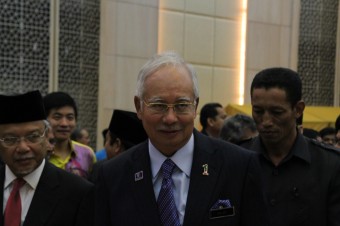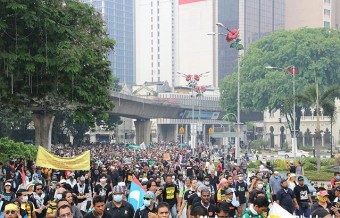Malaysia’s democracy in waiting

Following in the footsteps of the United States, who have mastered the art of turning a blind eye, playing the Gandhi of LGBTI rights in Russia while shaking hands with the Saudi’s, Australia has been honing its own skills of selective observation much closer to home.
While Chinese human rights are deplorable and an undemocratic Fiji is unacceptable, Sri Lanka receives our praise and free boats to help stop those fleeing the government’s post-war oppression of the Tamils.
After spending three months doing an internship at an online political newspaper in Malaysia last year, I found it almost impossible to find anything that even resembled the so called “flourishing democracy,” our then Prime Minister Kevin Rudd had praised the country for in 2008.
Instead of the pretty picture painted by our government and theirs, Malaysia’s political system is deeply flawed and corrupt with the country still ruled by the same party the British left in control at Independence.
Fifty-seven years and counting
The United Malays National Organisation (UMNO) boasts its fifty-seven years in power as a sign of its good work at meeting the needs of the people however the reality is anything but.
The government has continued to maintain its at times tenuous grip on power through a broad range of tactics, including state control over the media, widespread vote-buying and the use of colonial era British laws to arrest and arbitrarily detain opposition activists and politicians.
The government has presided over relatively good and stable economic growth, but the prosperity hasn’t spread and rising inequality has created public bitterness towards the ruling elite in one of the region’s most affluent countries.
Government linked companies dominate most aspects of business and widespread corruption has allowed for the leaders and government political parties to grow increasingly rich, and then dish out cash hand outs for votes on election day.
UMNO has tried to spread the economic benefits of the countries boom with the rural areas, hoping to use continued economic growth to hold on to support.
The state controlled pro-government media has led to a huge market for uncensored online media websites that have flourished over the last decade and serve hundreds and thousands of people daily, who no longer trust the government mouth-piece newspapers.

In the May elections last year the government managed to hold on to 133 seats to the oppositions 89, despite only winning 49 per cent of the popular vote. The huge contrast between the popular vote and the parliament seats, is due to highly gerrymandered electorates, with average constituency size for a government held seat is 47,000 while opposition seats have on average 78,000.
The lead up to the elections was marked by protests, in April 2012 an NGO group called ‘Bersih’ meaning ‘clean’ brought an estimated 300,000 people to the streets of Kuala Lumpur demanding electoral change and free and fair elections, only to be dispersed by the police using tear gas and chemically laced water-canons.
The Electoral Commission appeared to bow to public pressure, agreeing to some of the proposed reforms such as the introduction of indelible ink to prevent double-voting. However when election day came around the joke was back on the people, the ink supposed to stain the finger for at least seven days washed off straight away, later it was found to be food colouring.
The opposition’s strength
Malaysia has a complex ethnic and religious make up, the Malay people make up just over half of the population and around sixty per cent of Malaysians following Islam.
The Malay government has always played ethnic and religious tensions to its advantage, as well as actively disenfranchising the indigenous population who make up 11 per cent of the country by including them as Malays (the government invented the word ‘Bumiputera’ meaning ‘sons of the soil’ for this purpose).
While opposition parties have come and gone, the current opposition coalition Pakatan Rakyat has been united for the past four years and continues to grow in strength, now governing three states, two of them the most urban states of Selangor and Penang.
Pakatan is beginning to slowly make much needed inroads into mostly Islamic rural areas of the country, however the highly rural populations of Sabah and Sarawak continue to prop up the government with a non-proportional amount of seats across East Malaysia.
The strength of the opposition coalition despite being comprised of some unlikely partners in the Islamist Pan-Malaysian Islamic Party (PAS) and the mostly Chinese dominated liberal Democratic Action Party (DAP), is a show of the less racially divided Malaysia that is emerging and coming together under the common goal of changing the government.
In the last two elections Chinese and Indian voters, twenty-four and seven per cent of the population respectively, have abandoned the government , leading UMNO to move away from calls for national unity and instead continue peddling fear tactics and racial prejudice in hopes of maintain the Malay vote.
Sinking to inconceivable lows last year, police threatened to jail Indian parents who complained online when their children were forced to eat lunch in the bathrooms during Ramadan, while 2014 has already seen government funded political groups prompting attacks on Chinese Christian churches in the state of Penang.
The current Prime Minister Najib Abdul Razak came to power with the promise of reform, committing to end colonial era detention without trial laws and promising democratic change, which four years on hasn’t been realised.
However internal power-struggles within his party and fear over the governments declining support has seen Najib swing further and further to the right and any hope of democratic change under his leadership seem long gone.
Australia’s blindness
For Australia it has continued to be convenient to ignore the situation in Malaysia and praise the government there because Malaysia has been a continued partner in our war on refugees.
Malaysian authorities routinely and systematically abuse the many migrants from poorer Asian countries such as Bangladesh and Burma along with the growing numbers of refugees in the country. A culture of impunity among the police force contributes to allowing employers to hold migrants in slave-like conditions, while migrants are often arrested, displayed in front of the local T.V cameras and then sold back to their employers putting them further into ‘debt’.
Recently along with Sri Lanka, Malaysia was promised free boats to help stop people who may be seeking to come to Australia, while the Australia government takes no responsibility for the prospects faced by those who may be picked up trying to flee.
Australia should take a more honest role towards the human rights of all its neighbours, though in no- way advocating the white saviour complex across the region (again). We previously sent troops to Malaysia for thirteen years in the 50s to fight a local communist and independence insurgency.
In a rare event while in opposition the Liberal Party went out on a limb, boldly calling attention to the human rights abuses faced by refugees in Malaysia, conveniently however that was when Julie Gillard was proposing the unsuccessful ‘people swap’ deal in 2011.
“Imagine taking boat people from Australia to Malaysia where they will be exposed almost inevitably to the prospect of caning …” Scott Morrison said at the time.
However at his first meeting with Najib as the new Prime Minister, Tony Abbott was quick to apologise to Malaysia, saying that the harsh words towards the country was only a criticism of Labor and never of Malaysia.
Australia’s actions across the whole region, from Sri Lanka to Manus Island can only be seen as a cruel joke, in contrast to the image we choose for ourselves as a part of the somehow morally superior west.

